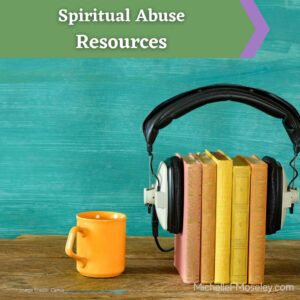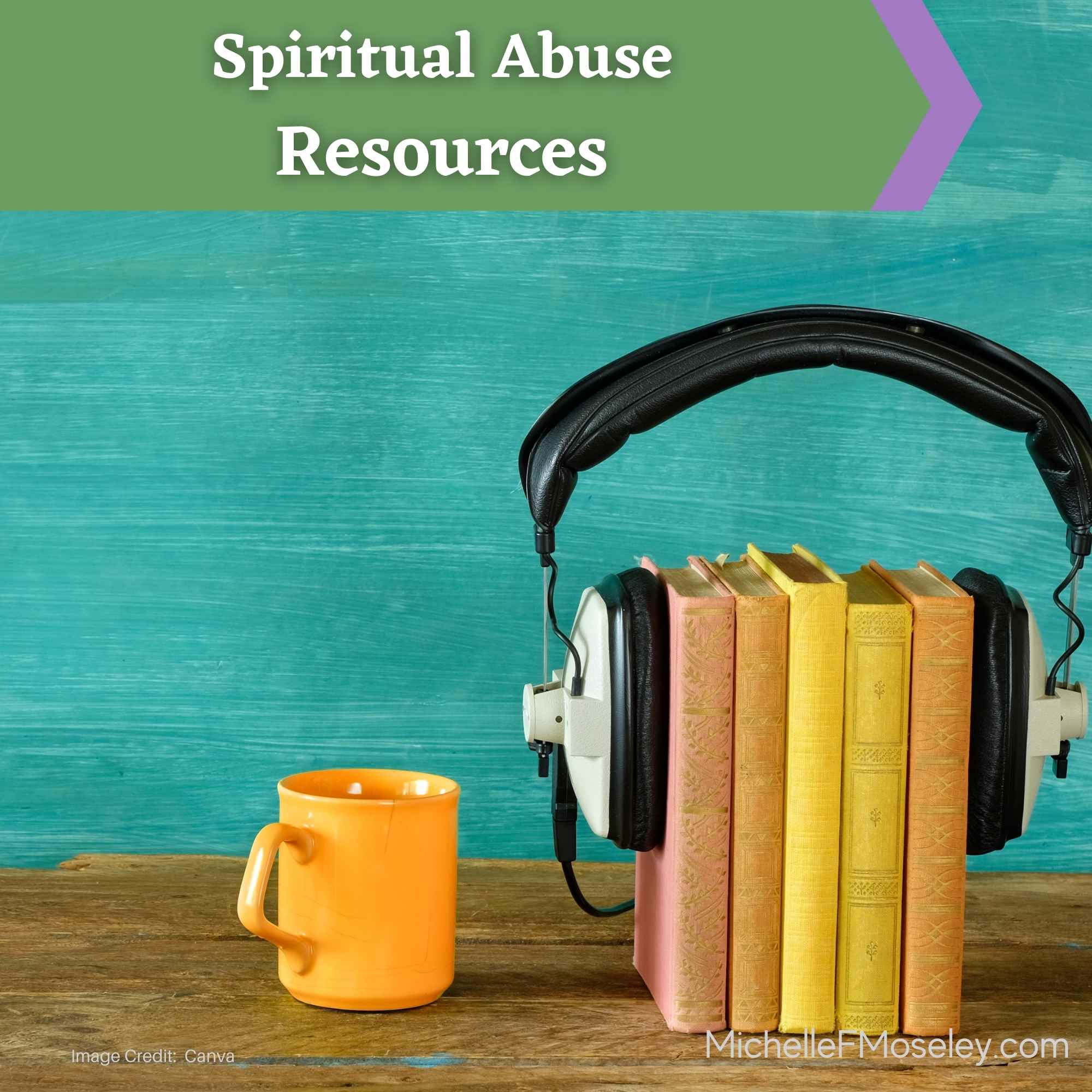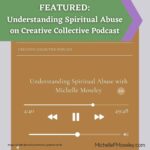January is Spiritual Abuse Awareness Month. This may be the first time that you’re coming across this term. Perhaps the descriptions I provided in this post resonated with you and you’re wondering where you can learn more. Maybe you still have a lot of questions about spiritual abuse and religious trauma and are looking for options to become more informed.
Regardless of what brings you here, I welcome you and hope that you find something in this post that is helpful for you.
My goal with this post is to begin to share a variety of resources, available in various formats, to allow you to further explore spiritual trauma at your own pace.

A Snapshot of Various Resources
The following are a few of the resources that exist for learning more about spiritual abuse and/or finding support for your own journey as a survivor of spiritual abuse. Each one offers somethign a bit different. I have provided a brief description of each, and encourage you to check them out as you seek to learn more.
Religious Trauma Institute
Home to a variety of resources for survivors of spiritual abuse and religious trauma. With options ranging from social media posts to informational webinars to trainings for therapists who work with religious trauma, this is a great resource on the topic.
Reclamation Collective
Reclamation Collective is another source for information, resources, and support related to spiritual abuse or religious trauma. They offer workshops and continuing education for therapists working with survivors. They offer a variety of support groups throughout the year, including groups specifically for folks with certain intersections of identity (in order to create as much safety as possible), and groups for therapists who are deconstructing their own beliefs. Reclamation Collective also has a Therapist Directory ( https://www.reclamationcollective.com/find-a-therapist-1 ) to help folks find a licensed professional who is a good fit for them.
Black Religious Trauma Recovery Network
This network grew out conversations that some of my Black colleagues were having about the unique aspects of their experience of spiritual abuse or religious trauma within the Black church. They are continually expanding the resources they offer and I will be highlighting them more fully in a future post.
Secular Therapy Project
This is a good resource for folks looking for a therapist who has no religious affiliation. At minimum, no licensed professional should ever attempt to proselytize / evangelize you with their beliefs. However, therapists who are listed with The Secular Therapy Project have additionally been vetted to ensure they have not received education at a religious institution and that they do not currently adhere to any religious belief system.
Megan Von Fricken
Megan is a trained psychotherapist, and exvangelical, and a clinically-informed coach who specializes in religious harm. In addition to these services, she sends out weekly emails on topics related to spiritual abuse and high-control religion, she runs a Facebook group for those recovering from high-control religion, and she posts regularly about these topics on Instagram – @reclaimingself.therapy
Journey Free – Recover from Harmful Religion
This is the site of Marlene Winell, one of the earliest (that I’m aware of) people to describe the experience of exiting a religion after being harmed and the impact of leaving. She described this as Religious Trauma Syndrome. Her website connects you to the many resources she offers, from an email newsletter to support groups to 1:1 coaching sessions.
Freedom of Mind
This site connects you to the resources of Steven Hassan, PhD. He has both personal and professional experience with cults and developed the BITE model to assist folks in evaluating groups on common cult characteristics.

Podcasts
Many people enjoy taking in information and exploring new topics via podcasts. And there is currently a wide variety of podcasts that address the experience of spiritual abuse from multiple viewpoints.
These are just a few of the podcasts (in alphabetical order) that I have found helpful in the way they handle these topics:
- Bodies Behind the Bus – “A podcast dedicated to sharing the stories of spiritual abuse survivors because being a body behind the bus is not the gospel.” I was featured on 2 episodes of this podcast, which you can learn more about here.
- Exvangelical – “Coming to terms with a messed up subculture. One conversation at a time.”
- Life After Leaven with Tamice Spencer-Helms – “Folx from all walks of life and society talk about picking up the shattered pieces of a faith we used to know. Life after Leaven is a podcast for those seeking to heal from the damage caused by toxic Christianity and rebuild something new and life-giving in its place.”
- Life After MLM – “True stories and conversations with survivors, advocates, and experts on the insidiousness of cults, frauds, scams, and pyramid schemes.” This may seem like an odd recommendation, but there are many parallels between multi-level marketing (MLM) and high-control religions. This podcast offers an opportunity to consider the topic on a different way.
- Sunday School Dropouts – “Our goal with this podcast is to dive deeper into some of the unique aspects of religious trauma resolution and recovery by bringing on experts, coaches, advocates, and therapists as well as folks who have their own lived experiences of healing from religious trauma, to educate, encourage, and challenge us as we do our own healing work.”
- Surviving the Black Church – “Surviving the Black Church Podcast is a podcast that sheds light and brings awareness to religious trauma and dismantles oppressive systems within the Black church.”
- Uncertain Podcast – This is the podcast of Tears of Eden. The mission of Tears of Eden is “to empower survivors to connect with their own agency to pursue the healing process from Spiritual Abuse.”
- Wise Jezebels – “The podcast where we examine pop culture and headlines with religious roots and check the fruit.”
**I have linked to each podcasts’ website or social media, rather than directly to a podcast platform, so you can find them wherever you prefer to listen to podcasts. Where the description is in quotes, I have taken that directly from their site.

Documentaries
The visual impact of a documentary can be a powerful way to understand experiences of spiritual abuse. Viewing documentaries about various cults, high-control religions, and harmful religious-based practices can shed new light on how you understand spiritual abuse.
There are a multitude of documentaries on these topics available right now. If you choose to watch them, I encourage you to check in with your own nervous system (especially if you are a survivor of spiritual abuse) and do some things to help you not feel overwhelmed by the content.
Some ways I avoid overwhelm when watching these documentaries include: not watching multiple episodes or shows back-to-back, having access to a cold beverage or spicy snack to help me regulate in my body if I start to feel overwhelmed, watching something funny and light after watching a heavy documentary.
Here are a few documentaries I have found helpful in understanding how spiritual abuse may occur, as well as its impact on individuals and communities:
- Boy Erased
- The Eyes of Tammy Faye
- The Family
- Going Clear: Scientology and the Prison of Belief
- Hillsong: A Megachurch Exposed
- Jesus Camp
- Keep Sweet: Pray, and Obey
- The Secrets of Hillsong
- Shiny, Happy People
- The Way Down: God, Greed, and the Cult of Gwen Shamblin
- Women Talking
**These documentaries are available on various streaming services and/or websites. A quick internet search of the title will help you locate each one, and provide a brief description.

Books
Sometimes reading (or listening to the audio of) a book is the most helpful way to engage with a subject. Throughout my journey of understanding my personal experience of spiritual abuse and learning how to best support other survivors, books have played an integral role.
These are just a few of the books, listed in alphabetical order by title, that I have found to be helpful resources:
- Leaving the Fold: A Guide for Former Fundamentalists and Others Leaving Their Religion – Marlene Winell
- Pure: Inside the Evangelical Movement That Shamed a Generation of Young Women and How I Broke Free – Linda Kay Klein
- Redeeming Power: Understanding Authority and Abuse in the Church – Diane Langberg
- Religious Refugees: (De)Constructing Toward Spiritual and Emotional Healing – Mark Gregory Karris
- Searching for Sunday: Loving, Leaving, and Finding the Church – Rachel Held Evans
- Trauma in the Pews: The Impact on Faith and Spiritual Practices – Janyne McConnaughey
- Uncultured – Daniella Mestyanek Young
- When Narcissism Comes to Church: Healing Your Community From Emotional and Spiritual Abuse – Chuck DeGroat
- When Religious Hurts You: Healing from Religious Trauma and the Impact of High-Control Religion – Laura E. Anderson, PhD ()
*I have linked these books via Amazon to provide an easy way to read more about them. If accessible to you, I encourage you to purchase books from your local bookstore or directly from the author’s website.

Other Resources?
Do you know of a helpful resource related to spiritual abuse or religious trauma that isn’t listed here? Please share it with me via the contact form on my website. I’m always looking to learn more and to add to the resources I am able to share with others.
There are also a few resources that I provide for survivors, those who work with with survivors as mental health or trauma profressionals. I provide both individual and group therapy options for folks located in North Carolina who may be struggling with their own experience of abuse or harm within religion. If you’re interested in scheduling a free consultation to explore what therapy with me might be like, let me know via this contact form. I also offer consultation and training to professionals who work with survivors of religious trauma.
Additionally, I provide workshops and seminars for those who work in religious or other faith-based organizations and who desire to understand and prevent spiritual abuse. The seminar for faith leaders, next offered virtually in May 2024, focuses on becoming more informed about general mental health concerns and creating a trauma-sensitive environment.
I hope that you find at least one resource within this post that helps you in understanding and healing from spiritual abuse. As Spiritual Abuse Awareness Month continues, I will be sharing more posts focused on this topic. Please stay tuned.
Michelle F. Moseley is a Licensed Mental Health Counselor in NC. She believes ALL people deserve respect, compassion, and access to mental and physical healthcare. Michelle specializes in working with survivors of religious trauma and with those who have body image concerns, finding there is frequent overlap in these areas. You can learn more about Michelle by visiting her website at MichelleFMoseley.com or following her on Instagram – @therapy_with_michelle
Sign-up for Michelle’s Monthly Email Newsletter to make sure you never miss a blog post


